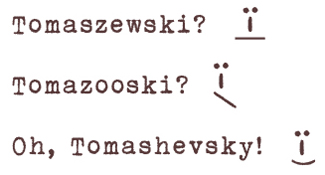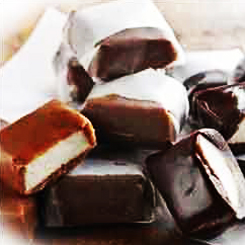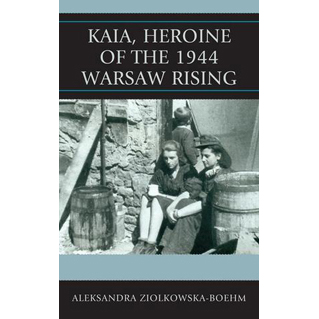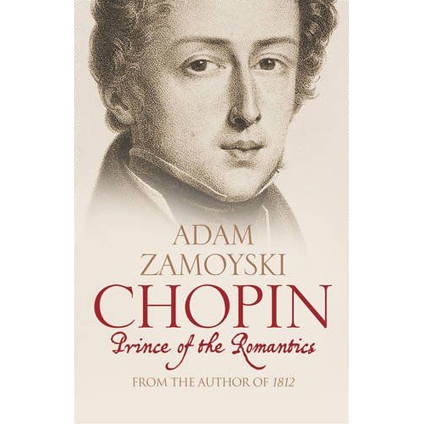 I have a friend whose name is Czajkowski. The same as that great Russian composer.
I have a friend whose name is Czajkowski. The same as that great Russian composer.
Who? Oh, you mean Tchaikovsky.
The Russians don’t use the Roman alphabet so their names are transliterated. And consequently, pronounceable. Transliteration is a very useful thing. My friend tells me she has never heard her name pronounced properly, not once since she arrived in Canada.
How about that Polish writer, Joseph Conrad? Would he have achieved the same success – and be remembered – as a great English writer, as Józef Korzeniewski?
Kościuszko? In the recent biography of Kościuszko, The Peasant Prince, author Alex Storozynski cites contemporary references to Kościuszko — with 13 different spellings of the name. Heaven only knows how it was pronounced. And hero or not, most Americans still can’t get it.
Jan Kozielewski or Jan Karski?
Modrzejewska or Modjeska?
Maria Skłodowska-Curie is usually known as just Marie Curie – and the Polish connection is lost.
Polish names are lovely. Phonetically consistent, one can pronounce them at a glance. Provided, of course, that one is Polish. Most Poles in the diaspora – and we’re told there are 21 million of us – live in an English-speaking ocean, among people who are equipped with ill-designed ears and tongues, their technical development inadequate to the task of mastering glorious Polish names. Such as, for example: Karasiewicz-Tokarzewski.
The English, for their part, insist that it is not their ill-designed ears and tongues but our ill-designed language that is at fault, a language that combines endless consonants – czdzsz – without relief from strategically placed vowels.
If you can’t spell it or pronounce it, can you possibly remember it? That is the problem. Simple. The solution however, is not so simple. Or at least, certainly not one on which Poles can agree.
Some completely anglicized their names and never had a problem again. Except, perhaps, with their self-identity, not to mention the contempt of their fellow Poles. If you choose this course, try to become a great writer, like Conrad, or something equally impressive. Your readers will remember your name, and nobody will hold it against you.
Others chose to modify their Polish names, keeping the Polish identity implied in the name but making it easier to say, to spell – and to remember. This can work quite well. Modrzejewska, a great actress, knew instinctively that name recognition was crucial to her career but, super-patriot that she was, she could never have changed it to Smith. Modjeska was the perfect solution, easy but with a touch of exoticism. And unmistakably Polish.
A few people anglicize the spelling. I’ve seen Dombrowski instead of Dąbrowski, for example. In this case, the first syllable sounds lovely but they are still stuck with that awful English “ow” as in “cow” sound in the second. A terrible mutilation of a distinguished name. Stokowski, Twardowski, Mostowski: all suffer this cruel fate. To return briefly to Mme Curie: one little letter changed in her Polish name and everyone could say, and remember: Sklodovska!
Whenever I hear my own name, Tomaszewski, pronounced Tomazooski, it feels like an electric shock has been administered to my ears, the pain radiating through my brain and down my spine all the way to fingertips and toes. Sometimes I can preempt this attack by slipping a sign in front of the one who is about to injure me: Tomashevsky. And then, it’s music.
But it is the Poles who have a “ck” in their names that suffer most. A noble Rudnicka turns into a comic Rudnikka, a dignified Sawicki into a Sawikki.
There are many more oral violations perpetrated by our English-speaking friends, and even by fellow Poles who gave up. It is instructive that wherever the English went, including Ireland and India, the native languages buckled under the impact of English. But neither the Germans nor the Russians, no matter how long and how fiercely they attacked, even when they joined forces, neither was ever able to dislodge the distinctive Polish language, the only one that insists on using a “W” when all other Slavic tongues use a “V,” and then crosses an “L” to make it sound like a “W.” (Here I must say that anyone who has ever heard the beautiful lilting sound of Polish as once spoken in the Kresy must truly regret the intrusion of this silly letter. No mincing Łs for the people of the borderlands; they removed the marbles from their mouths.)
So, what can be done? Some insist nothing should be done. “Let them learn!” they shout. But of course “they” don’t. A few of our nearest and dearest perhaps will, but in general, the rest will not. Like it or not, we can’t have it all. It’s either the spelling, or the pronunciation.
We have, at the present time, a perfect “teaching moment” if we want to try the “Let them learn” approach. The enchanting and very talented Mia Wasikowska is well on the way to being a household name. What a shame if it, too, gets mutilated. It’s an easy name – for those who know a “W” should be pronounced as a “V.” But it would require a vigilant collective effort to get this lesson out. So, whenever an opportunity arises, say it properly, or show the phonetic spelling in brackets. Wasikowska (Vasikovska). Lovely! Music! She deserves nothing less!
Failing a collective teaching success, is it reasonable to transliterate a language that is already in the Roman alphabet? Should we? Wouldn’t it be nice to hear people say your name correctly and, better still, remember it? If they can’t say it, they will not remember it. Or would that be just caving in? But do we not cave in on the pronunciation? On the one hand this, on the other hand that. What is to be done?
Truly, it is a dilemma of such great proportions that, at the risk of introducing a divisive issue into our otherwise tranquil and united nation, I believe it can only be resolved by putting the matter to a vote.
What do YOU think, readers? To vote, scroll down to the poll, below. CR




Hello Pani Tomaszewska– I am of Polish background (3rd generation) on my mother’s side, and I attained my ‘Tomaszewski’name through marriage. For 30 years, I have listened to the vain attempts of Americans to try pronouncing my name. I always let them try, and they usually fail, but they always are polite in asking exactly how to pronounce it. I see it as a teaching moment. My usual way to tell them is to say, “think of Thomas the chef”, and then it comes out of them more naturally. Then I add a lesson, since they always comment on the multiple consonants. I explain that it isn’t any different than English — sz is like our sh and cz is like our ch. What is really irksome though, are those people, especially supposedly well-educated ones, who refuse to try saying things that are different. We named our son Jan – how simple is that? Some of his teachers insisted on continually mispronouncing this simplest of names with Jan (like the English diminutive for Janice) or John. To me it seemed a form of arrogance on their part.To my son’s credit, even as a tiny one, he always insisted on the correct Polish pronunciation, and never changed it. I, for one, am in favor of retaining correct ethnic spellings and help everyone else learn a little something by attempting correct pronunciation! Thanks so much for your interesting articles.
I share your view, Carla. I can’t bear the thought of changing the spelling so have to keep having my ears assaulted. I use the same system you do, reminding people that sz is really no more difficult than sh. However, I don’t go into all the variations in Polish letters because I’d lose my case!
As for my original name, I did compromise a long, long time ago on Irena Tomaszewska, so I only use the Polish feminine form when I speak Polish.
Thanks for writing.
I don’t agree with the vote. Why do you have to choose? I wish it pronounced AND spelled correctly. Just a simple think when meeting someone for the first time if they are supposed to remember your name. If it is a fleeting meeting, pronounce it correctly and if if they want more, hand them a business card.
Larry
2015JL23 16:15 living in Sydney Australia, originally from Detroit Mi USA and ethnic background (all 4 grandparents are born in Poland)